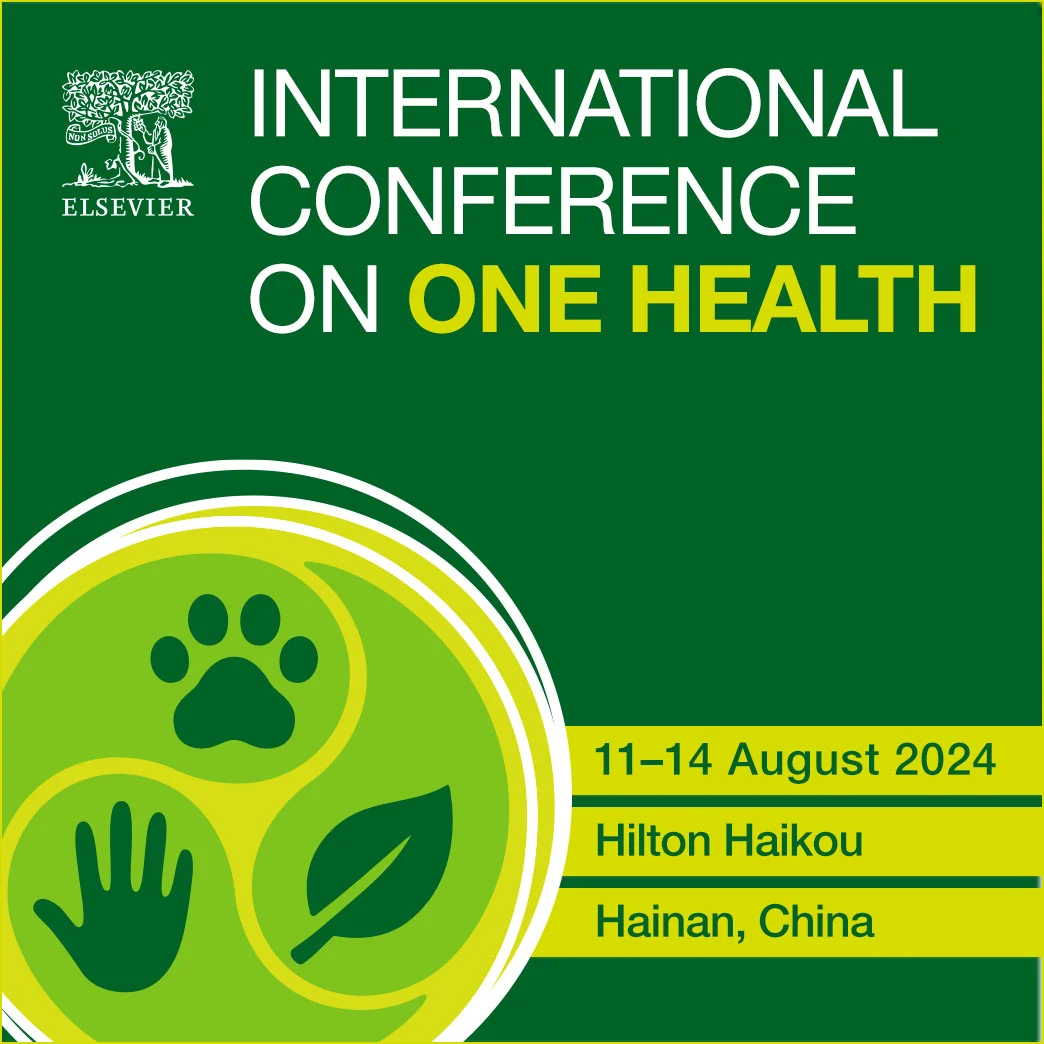International Conference on One Health
11-14 August 2024, Hilton Haikou, Hainan, China

In collaboration with Hainan Medical University, and the One Health Center, Shanghai Jiao Tong University, Elsevier is proud to host the upcoming International Conference on One Health to be held at the Haikou Hilton in Hainan. The Conference will bring together leading researchers in One Health to share their latest findings and insights on tackling critical challenges including zoonotic diseases, antimicrobial resistance, and ecosystem sustainability. The meeting will serve as a crucial platform for researchers, policymakers and stakeholders to exchange knowledge and foster collaboration to address the many complex challenges in implementing a One Health approach.
Hainan, often referred to as the "Hawaii of China," is a tropical island paradise known for its stunning beaches, lush greenery, and vibrant culture. With its warm climate and crystal-clear waters, Hainan is a popular resort destination for summer holidays, offering visitors a relaxing and rejuvenating escape from the hustle and bustle of city life. Whether you're looking to lounge on the beach, explore the rich local cuisine, or immerse yourself in the island's natural beauty, Hainan promises a memorable and enchanting experience for all travellers.
As of February 9th, 2024, citizens of the 59 Visa Free eligible countries holding ordinary passports (other travel document holders are not eligible for visa free entry) may enter Hainan Province for commercial activities and trade, visit and exchange, and family reunions, receiving medical treatment, attending exhibitions, taking part in sporting events and other needs (excluding long-term working and studying) for up to 30 days without a visa.
Please find more information about Hainan Visa Free Entry Policy here: https://www.visaforchina.cn/MNL3_EN/tongzhigonggao/280508735187718144.html
Conference topics
Examining how the health of animals, humans, and the environment is linked through the food chain and ways to ensure safe and nutritious food.
Highlighting the interconnectedness of wildlife health, ecosystem integrity, biodiversity conservation, and zoonotic disease transmission to humans and wildlife disease transmission to livestock, also including strategies for effective disease surveillance and prevention of future outbreaks.
Focusing on the global issue of antimicrobial resistance, its impact on human and animal health, and potential solutions. Exploring the link between environmental factors, such as pollution and improper waste management, and the development and spread of antimicrobial resistance.
Exploring the effects of environmental pollutants, including particulate matter and industrial pollutants, on human and animal health and finding ways to mitigate their impact. Analyzing the impact of water pollution on the transmission of waterborne diseases like cholera, typhoid, and hepatitis A. Examining the impacts of floods and droughts on human and animal health.
Highlighting the importance of interdisciplinary collaboration and data sharing in monitoring and addressing health challenges. One Health Approaches for Mitigating Disease Impacts and highlighting how interdisciplinary strategies between veterinary professionals and public health experts can improve health outcomes.
Identification, monitoring, and response to new and re-emerging diseases and of novel pathogens and changes in disease dynamics affecting humans and animals. Understanding how environmental changes, such as altered ecosystems due to climate change, can drive new disease emergence and the importance of disease modelling for predictive situations.
Addressing the need for supportive policies and regulations that promote One Health principles and collaboration and how to integrate plans and policies in an economically viable fashion.
With implications in many of the fundamental aspects of our inter-connected health, including food quality, safety, and security and air and water quality, amongst many other factors, maintaining a biodiverse ecosystem is a cornerstone of successful One Health policy implementation and not solely a conservation or environmental concern.
Fostering cross-sector, cross-border partnerships to combat tropical and neglected diseases more effectively.
Conferences deadlines
Deadline for the submission of abstracts | 3 June 2024 |
Early Bird registration deadline | 19 July 2024 |
Conference chairs

Aileen Marty
College of Arts, Sciences, and Education and Dept of Translational Medicine, Herbert Wertheim College of Medicine,Florida International University, Miami, USA
Aileen Martyの続きを読む
Guo-jing Yang
School of Tropical Medicine, Hainan Medical University, Haikou, China
Guo-jing Yangの続きを読む

Conference committee

Lucy Jones
Publisher (Parasitology & Insect Science), STM Journal Publishing, Elsevier
Lucy Jonesの続きを読む
Dale Seaton
Executive Publisher (Parasitology & Insect Science), STM Journal Publishing, Elsevier
Dale Seatonの続きを読むCo-organizer
